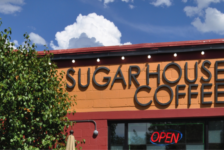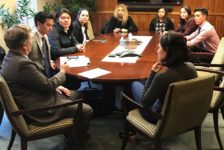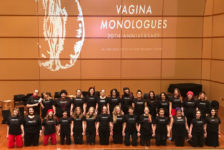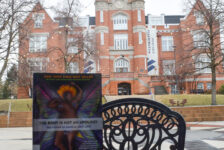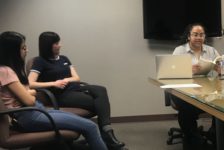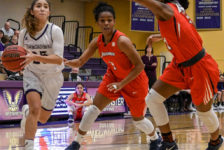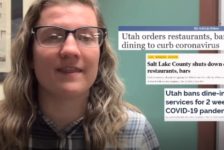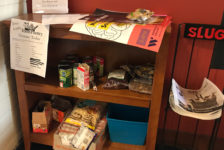
Senior English and sociology major Alaa Al-Barkawi is a refugee from Saudi Arabia. Al-Barkawi said she knows only one other refugee on campus, despite the college’s presence in refugee outreach centers like Walkways to Westminster. Photo by Taylor Stevens
Walkways to Westminster is a new outreach program created by the Center for Civic Engagement for the fall 2016 semester that aims to help prepare students in South Salt Lake for college. Volunteers in the program mentor students and their families on college readiness with the hope of reaching students Westminster hasn’t traditionally represented on campus.
“Westminster College student mentors strive to keep Walkways students and families connected to a college-going culture with hands-on activities and resources that encourage them to prepare for life after high school,” said Monica Ferreira, the program’s coordinator.
The students attend Promise Salt Lake and are from underrepresented groups and first-generation families, many of whom are refugees—an almost nonexistent population at Westminster, despite the college’s work with the groups through programs like Walkways to Westminster.
The lack of refugee diversity on campus is something Alaa Al-Barkawi, senior English and sociology major, knows a lot about.
“I only know one other refugee student on campus,” Al-Barkawi said. “It’s scary to hear that number.”
In 1991, before Al-Barkawi was born, her family escaped Saddam Hussein’s regime and sought safety in a Saudi Arabian refugee camp for five years. She spent the first three months of her life in this camp until her family moved to Salt Lake City.
Even though Al-Barkawi has been in the United States for most of her life, she said the label “refugee” never leaves, and she often experiences discrimination and alienation because of her background.
“Often students of color feel marginalized when they’re constantly learning histories and perspectives that don’t reflect their own,” Al-Barkawi said. “The school is made up and is run by a predominantly white body of students and faculty, which means that students don’t necessarily think about their own privilege because our curriculum and student body lacks diversity. Many students are unsympathetic to the refugee crisis, and it’s detrimental for refugees to hear that.”
Al-Barkawi said the lack of diversity on campus creates an exhausting “circle of fatigue.”
“They have to educate their fellow peers, professors and staff about issues on race and the intersections of those issues when they aren’t responsible for educating as their white counterparts,” Al-Barkawi said.
When Al-Barkawi was applying to Westminster, she said she saw her friends decide not to choose Westminster because they didn’t receive enough scholarships or were waitlisted. Al-Barkawi said many students from her school, Taylorsville High School, chose not to apply. She said Westminster rarely marketed to Taylorsville and other low-income schools in the area, making it hard for some students to feel Westminster was an option.
Westminster’s admissions staff said it conducts preliminary visits with all the high schools in Utah and does one or more follow up visits with most of the schools, including Taylorsville. However, some low-income schools don’t receive any follow up visits, according to graphs from admissions.
“We focus on schools where students show interest and also schools where we want to grow the interest,” said Darlene Dilley, the director of admissions. “We absolutely are interested and committed to recruiting a more diverse class. We accessed a list of thousands [of] students nationwide from underrepresented populations made available by ACT and reached out to these students.”
Many of the students who go to Promise Salt Lake said they are starting to look at colleges and universities. They have big dreams about where they will go. Almost every student named Harvard or the University of Utah at the top of their list—but didn’t list Westminster.
The students talked about liking the facilities and educational opportunities Westminster provides, but said the cost of tuition is more than they can afford. The students said they would consider attending Westminster if they received a scholarship.
Dilley said Westminster currently bases most incoming student scholarships on merit: the ACT score and GPA of the student, with GPA as the heaviest-weighted factor.
Most refugee students come from families who speak several languages but still haven’t mastered English. The ACT is designed for students who have college-level English skills, which refugees may not have—potentially creating an obstacle to their enrollment at colleges like Westminster that place an emphasis on test scores.
“Even though we give out thousands of dollars in scholarships each year, the price of our tuition is very scary for refugee families and loans are not a possibility for them,” Ferreira said. “Our current process we use to administer scholarships are based on merit that is a combination of ACT and GPA. This will automatically dislodge most refugee students.”
Westminster offers some scholarships for incoming first-year students who belong to underrepresented groups, including Native American students, Hispanic students, students of color and first-generation students.
Both Al-Barkawi and Ferreira said if Westminster were to change first year scholarships from merit-based to holistic, the campus would see more refugees—and a more diverse population—enrolling.
Al-Barkawi works at Promise Salt Lake as mentor to the students. While she knows that the main goal of Walkways to Westminster isn’t recruitment to Westminster, she said the program pushes it—and students don’t like it.
“They don’t feel like they should go to Westminster,” Al-Barkawi said. “And when a school has a lot of issues with race and diversity, it’s hard for me to advocate them going to that school.”
But Al-Barkawi said the educational opportunities at Westminster are unbeatable, making it hard for her to know how to advise the students.
The students are more hesitant to talk about Westminster’s diversity issues than Al-Barkawi is, but they said they don’t know if they would feel comfortable at Westminster because of how little racial diversity the school offers. They said they don’t see many college students who look like them or hear many who speak the same languages they do, which discourages them from applying.
“I think that the school needs to reach out to these students,” Al-Barkawi said. “Just because they do a program at a South Salt Lake school, they suddenly think they will get all of these students attending, and that isn’t it.”
Ferreira and Dilley said Westminster is already taking steps toward creating a more diverse and inclusive campus.
“[Walkways to Westminster is] doing great things with refugee students in South Salt Lake regarding college access,” Dilley said.
Al-Barkawi is more tentative to say that Westminster has started to change.
“Even if the school were to admit more refugee students, how can we possibly expect them to feel comfortable or succeed when the [social] environment is not made for them to be safe or feel accepted?” Al-Barkawi said. “Academia itself is still largely a space of white dominated thought. We need to work on decolonizing the academy, which means putting a spotlight on the voices who are often never heard. Admitting refugee students can help us bring an intersection of the voices needed on our campus and beyond.”

